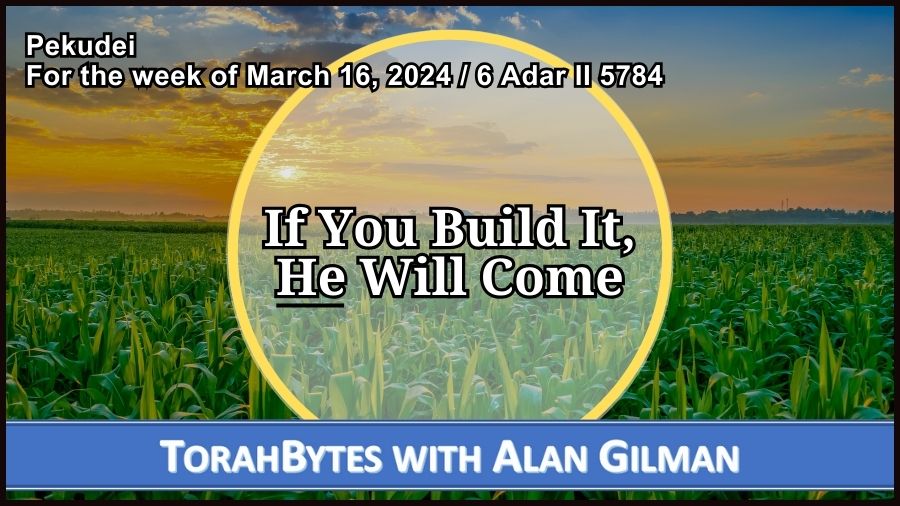
For the week of March 16, 2024 / 6 Adar II 5784
Pekudei
Torah: Shemot/Exodus 38:21 – 40:38
Haftarah: 1 Kings 7:40-50
Originally posted the week of February 1, 2014 / 1 Adar 5774 (revised)
Then the cloud covered the tent of meeting, and the glory of the LORD filled the tabernacle. (Shemot/Exodus 40:34)
A major component of the Torah is the instructions God gave Moses for the building of the Mishkan (English: Tabernacle), the large and elaborate, yet mobile structure designed for the offering of sacrifice. It was the precursor of the permanent Temple first built many centuries later under King Solomon, David’s son.
In the 1989 film “Field of Dreams,” Kevin Costner plays Ray Kinsella, a novice farmer who hears a voice, saying “If you build it, he will come.” He believes that if he tears down his corn field and builds a baseball diamond, then a disgraced player from the distant past by the name of Shoeless Joe will come back. Ray does it, and not only does Shoeless Joe return but several other ball players as well. However, neither Joe nor any of these players is the one of whom the voice spoke. I won’t tell you who it is in case you haven’t seen the film. The point is Ray built “it,” and “he” did come.
While not a direct quote, God basically told Moses, “If you build it, I will come!” Field of Dreams is a fantasy. The Mishkan is real. It was essential that Moses followed God’s instructions carefully, because God wanted to live there. Moses built it (meaning it was built under his supervision) and God really came (see Shemot / Exodus 40:16-38).
We learn from the construction details of the Mishkan that God is very particular about where he lives. God is not into “it’s the thought that counts” or “as long as your heart is in the right place.” In fact, the Bible teaches that no one’s heart is in the right place (e.g. Jeremiah 17:9). That’s why we need to come to God on his terms alone. If the people of Israel didn’t follow God’s instructions, he would not dwell in the Mishkan. But they did, and he did.
One of the things that makes the design of the Mishkan so special is that it is patterned after God’s heavenly dwelling (see Hebrews 8 – 9). Exactly how the earthly version parallels the heavenly one, I don’t know; but it does. One way may be how the various items inside the Mishkan, especially the two-room sanctuary, the Holy Place and the Most Holy Place express God’s truth. The Ark of the Covenant speaks of the presence, mercy, and loyalty of God; the lampstand, his light; the table of bread, his provision; the incense altar, prayer. It would be difficult to overemphasize the importance of these items. They are not simply ritualistic elements but speak of how life is really meant to be lived, the most important of all being our need for the very presence of God, which is the main purpose of the Mishkan: If you build it, he will come.
The Mishkan shows us that God came, but. We see this through the existence of a curtain that divided the two special rooms. Only the cohanim (English: the priests) could serve in the Holy Place, which they did on a daily basis. But the Most Holy Place, which represented the presence of God, could not be accessed except once a year on Yom Kippur (English: Day of Atonement), and then only by the Cohen HaGadol (English: the High Priest). This arrangement was designed intentionally to demonstrate to the people of Israel that full access to God was not available. If you build it, he will come; but don’t get too close!
Could you imagine having someone living with you who stayed behind closed doors all the time? Your very existence and identity is wrapped up in that person, but you could never get near to them. It’s not that the person doesn’t want to see you or have relationship with you. It’s that there’s actually something about you that is keeping the other person from getting close.
The people of Israel needed to learn that their sin, like the curtain, erected a barrier between them and God. Sin is that principle of life that twists human nature into something substandard, lacking the spiritual and moral qualities God requires. The sacrificial system addressed the sin problem, but never resolved it. Not resolved until the sacrifice of all sacrifices, that is. When Yeshua died, the dividing curtain tore in two (see Matthew 27:51). It’s as if his sacrificial death kicked down the door that kept us from God. The Mishkan reminds us that God’s desire is to dwell with his people. Now with the coming of Yeshua, he is both with us and accessible.
All scriptures, English Standard Version (ESV) of the Bible
I am in desperate need of His holy presence. So thankful that a way has been made for us to draw near.